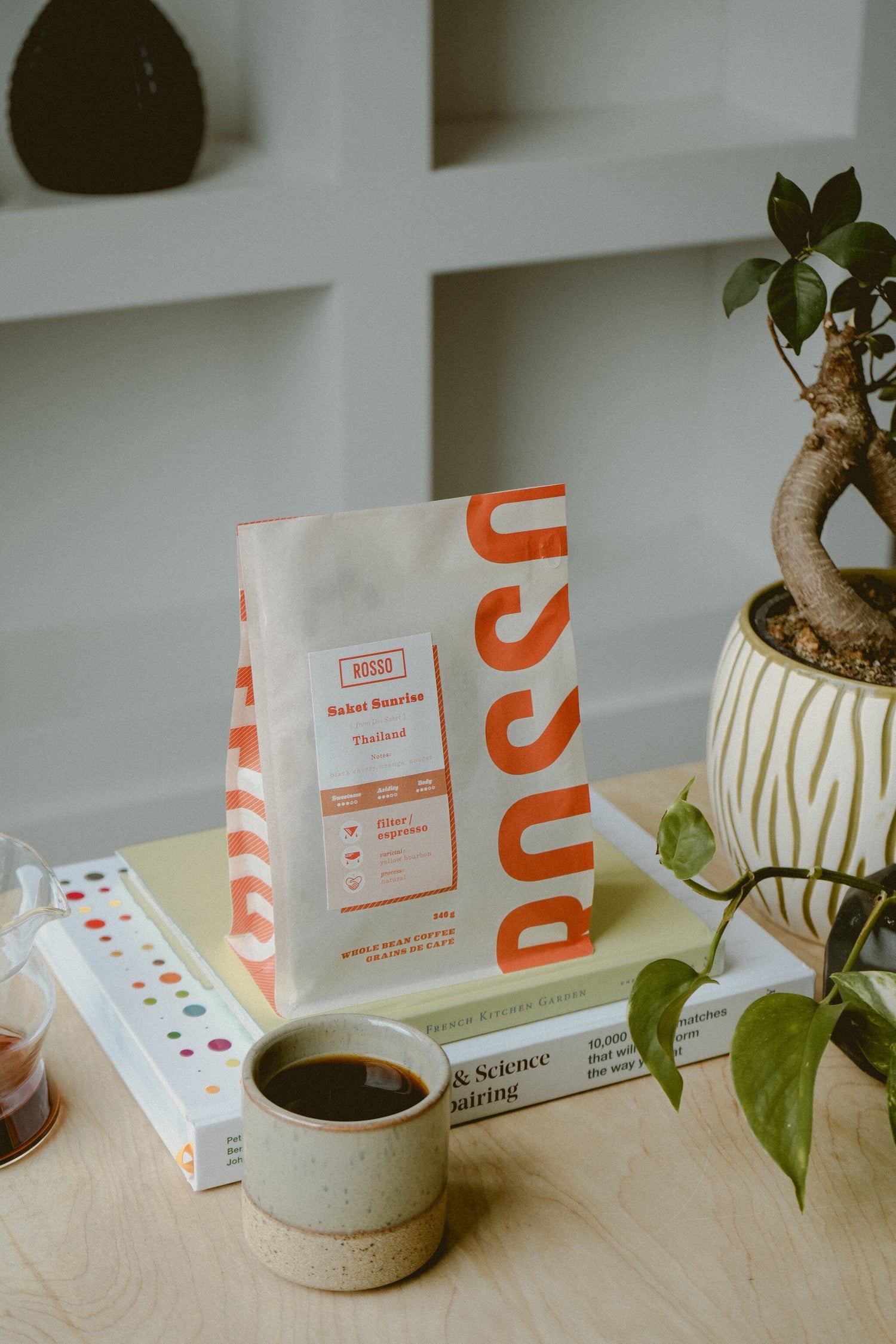Today was a long day. Car rides seem to be our life at this point. We started in Kigali and drove out to Nyamasheke, which takes about 3 hours. Thankfully, the views are amazing in nearly every direction.
The goal for the day was to see three washing stations: Gisheke, Kilimbi and Rugali.
Gisheke is a new station to the Muraho family and it's a really interesting one to keep an eye on. It's located near both Kilimbi and Rugali, but has a very fascinating element - it's only accessible by boat. There are literally no roads that run to Gisheke. All the coffee received at the station is by way of boat on the bordering Lake Kivu. How cool is that!?

So we jumped on a boat near Rugali and made our way to Gisheke. On the ride, Gaudam pointed out a few small islands on the lake, with a handful of houses and some coffee plants growing. These cherries exclusively go to Gisheke and, in my opinion, will make for an interesting micro-lot of coffee.
Then we saw the tiniest little island that was maybe 50 feet by 50 feet with a couple of cows grazing. We were both baffled. Get this: Lake Kivu has cows, native to this area that swim. That blew my mind! Another fun Lake Kivu fact - it goes as deep as 480 metres and has a natural offset of methane gas (probably to do with the swimming cows) that the country is considering utilizing for electricity! Super neat.
We landed our boat and hiked into Gisheke. It's a washing station that previously existed. The Muraho family has purchased and upgraded it just a few months ago, before the season started. Their manager, Balthazaar, used to work at Rugali and excelled there. So, they have now given him the opportunity to manage his own station! From what we saw, the station is organized, the staff seems to be motivated to work hard, and the infrastructure is great - there's 6 fermentation tanks, prepped for large volumes when they come. Emma and Gaudam gave some critiques as the "bossmen" do when they come to visit. But overall, we were impressed and now excited to cup the coffee of Gisheke on Sunday or Monday. Super scenic station for photographs too.

We hiked back to the boat, which had thankfully waited for us, and continued to Kilimbi. Last season, we drove to Kilimbi pretty easily. I mean the road wasn't perfect, but the team at Muraho had built bridges, connected the road system and made Kilimbi accessible by car. It was neat to arrive from a different perspective and hike up from the water.
Kilimbi has become the 'experimental' station and we love that! The washed coffees look SO clean and, personally, I was a big fan this year. There's a handful of different styles of honey process happening, including one concept which we originally came up with. We have it on our menu as Kilimbi Experimental, but the team here is calling it Hydro, and I think that might just stick. The idea came from influence in the wine industry, from a process called Appassimento. The concept in that industry is to dry the grapes and let the sugars concentrate before juicing, leading to a more sweet style of red wine - this happens in Northern Italy, in Valpolicella. For us, we wanted to have the sweet, fruit forward flavours of a Natural processed coffee with the clean and crisp flavours of a Washed coffee. A fun experiment for us, with overall positive results, thus far. It's also nice to see it has led to further experimenting by Muraho with half a dozen or so trials happening while we were there.

We brought coffee brewing equipment with us on the trip, as we always do while traveling to origin. What I mean is we physically brought it with us on the boat today and hiked in with it with the plan to share a bag of Kilimbi from Rosso with Joseph and his team, then to brew it for them so they could try it. They were incredibly proud to see the bag with their name on it and excited to try the coffee. It turned into a crash course brewing lesson and they now want their own brewing gear. These guys have never tried the coffee they produce as they're so many stages away from the actual brew - resting, dry milling, roasting, grinding, brewing. Bringing the brewing component to them was very heart warming.

We think we're in for a treat with Kilimbi coffees this coming season - simply based on the appearance of the drying beds and the experiments in progress.
Our last station of the day was another boat ride away. After all, we jumped on the boat close to Rugali and left that for the last of the tours. It must have been about 5:30 as we arrived. The sun was setting quite quickly at this point. It's an equatorial country, so you can imagine sunshine all day from 6am to 6pm.
Similar to Kilimbi, we came in with our brewing gear and a bag of Rugali Natural, with intentions to share the spectacular coffee Radjab and his team at Rugali were producing. Again, hoping to show them how delicious and special the coffee was they were creating. This time I had a more intrigued audience and had requests for a second brew! Success ;)
We did a quick lap around Rugali and saw the coffees that were currently drying. Here and Kilimbi are both having lower than expected volume this season, due to lots of rains recently. When there is too much rain and the cherries are trying to ripen, they absorb more water than they can hold and split open or fall from the tree. Both of these situations can lead to disease, if it is not cleaned off the tree or off the ground in a timely manner. These cherries are also no longer viable for further production - purely lost yield.
It's a bummer that coffee is so vulnerable to weather conditions. It makes it very difficult to forecast or really structure your operation if the weather doesn't want to play the way you want it to. I've said it tons of times before and I'll say it again, coffee is really hard at all stages of the supply chain. Weather doesn't just affect the coffee producers too, think of how our long drawn out Winter in Calgary has affected our side of the coffee chain. We, however, didn't physically lose a chunk of our crop for the year...
On the bright side, these teams can now focus purely on quality with the coffee they do have, so hopefully you're looking forward to some outstanding Rwandan offerings later this year.
Tomorrow we drive all the way to the Northwest of the country to visit Shyira, Vunga and Bumbogo. Another long day with hours in the car. It'll be worth it when it's all said and done.

Different honey processes happening at Kilimbi




